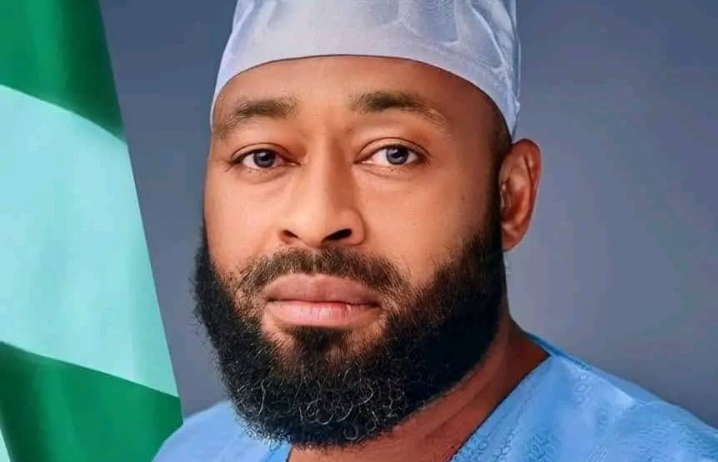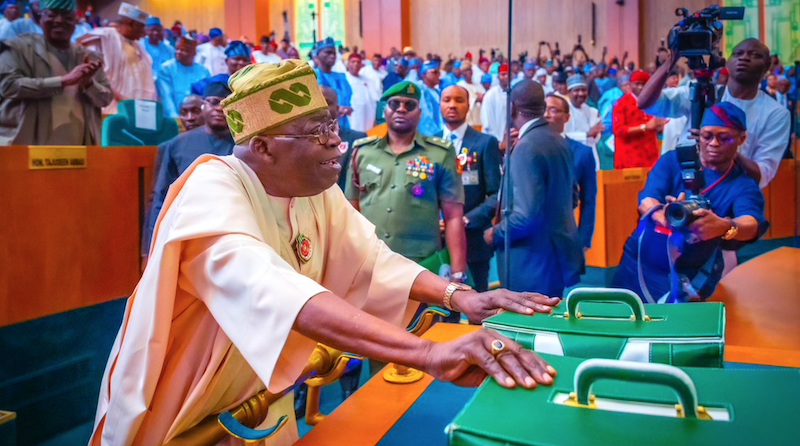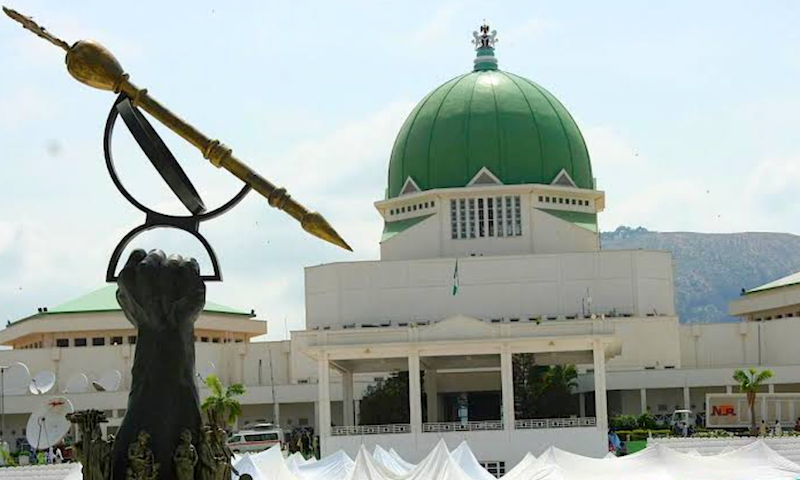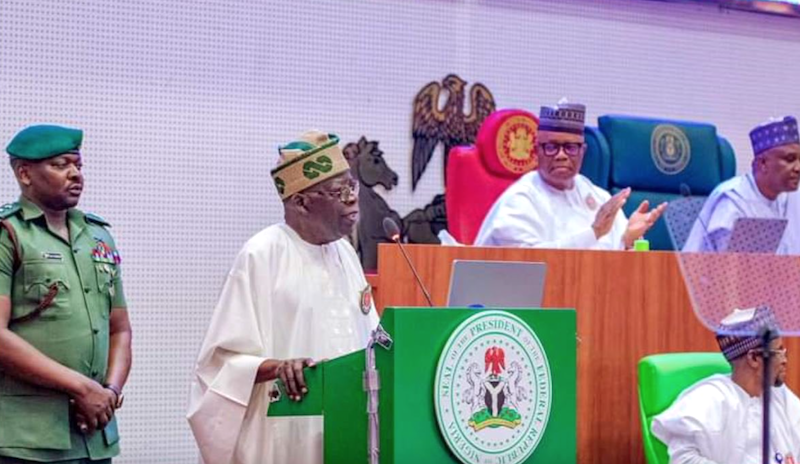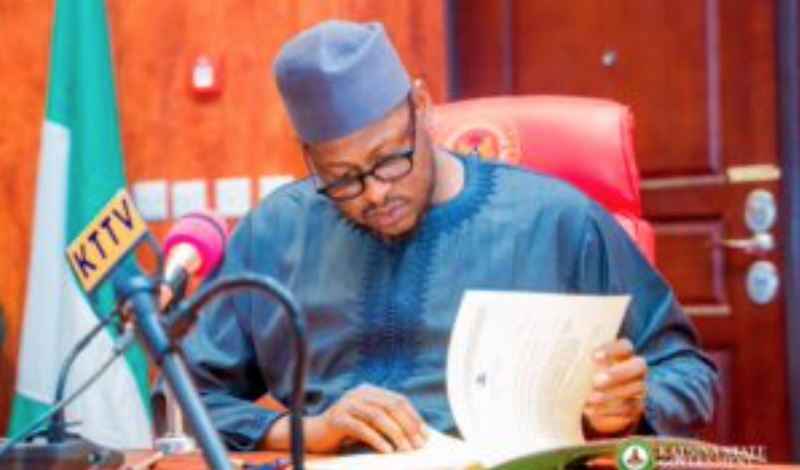President Bola Tinubu on Wednesday assured Nigerians of better days ahead, saying economic reforms introduced by his government have started yielding positive results.
The president said there had been noticeable signals of improved security, education, and health care, as well as a 3.46 per cent GDP growth in the third quarter of 2024.
President Tinubu gave the assurance at the National Assembly during the presentation of the N49.7 trillion 2025 Appropriation Bill to the joint session of the Senate and House of Representatives.
“The reforms we have instituted are beginning to yield results. Nigerians will soon experience a better and more functional economy.
“Global economic growth for the outgoing year 2024 was projected at 3.2 per cent, and against predictions, our country made significant progress.
“Our economy grew by 3.46 per cent in the third quarter of 2024, up from 2.54 per cent in the third quarter of 2023.
“Our Foreign Reserves now stand at nearly 42 billion dollars, providing a robust buffer against external shocks,” he said.
He added that the country’s rising exports were reflected in the current trade surplus, which stood at N5.8 trillion, according to the National Bureau of Statistics.
“These clear results of gradual recovery, among others, reflect the resilience of our economy and the impact of deliberate policy choices we made from the outset,” he added.
Tinubu attributed the successes recorded so far with the economic reforms to the patience, resilience, and tolerance of Nigerians in supporting the process.
The President projected an expenditure bill of N49.7 trillion, which is 35 per cent higher than the N28 trillion budget of 2024.
He said the new budget would prioritise education, healthcare, and security.
Tinubu said the 2025 budget would focus on restoration, securing peace, and rebuilding prosperity.
He said this reflected the core vision of the Renewed Hope Agenda, which was to improve the livelihoods of Nigerians by strengthening social and physical infrastructure and ensuring inclusivity in reaching development goals.
“The 2025 Budget Proposal again reinforces our administration’s roadmap to secure peace, prosperity, and hope for a greater future for our beloved nation.
“This budget, christened ‘Budget of Restoration: Securing Peace, Rebuilding Prosperity,’ strikes the core of our Renewed Hope Agenda and demonstrates our commitment to stabilising the economy, improving lives, and repositioning our country for more outstanding performance.
“The journey of economic renewal and institutional development, which we began 18 months ago as a nation, is very much underway,” he said.
Tinubu said the budget would consolidate the policies instituted to boost human capital development, increase the volume of trade and investments.
He said that it would also bolster oil and gas production, get the manufacturing sector humming again, and ultimately increase the competitiveness of the economy.
He said the ongoing economic reforms would not be reversed; instead, they would be strengthened to build on the gains of stimulating the economy to be more robust, equitable, predictable, and globally competitive.
“We do not intend to depart from this critical path to strengthen the Nigerian economy. Just as I believe in the resilience of our economy to withstand the current challenges, I also strongly believe in the resilience of the Nigerian people.
“Again, I summon the unstoppable Nigerian spirit to lead us on as we work to rebuild the fabric of our economy and existence.
“The improvements we witnessed in the 2024 budget have led us into the 2025 budget.
“The goals of advancing national security, creating economic opportunities, investing in our youthful population, infrastructure development, and national re-orientation form the core of the 2025 budget.
“But more than that, this will lay a solid foundation for Nigeria’s future growth trajectory,” President Tinubu stated.
The President told the lawmakers that the Nigerian economy was gradually rebounding.
President Tinubu said the 2024 budget recorded remarkable milestones. One of them was the N14.55 trillion in revenue realised by the third quarter, representing 75 per cent of the target for the year.
Also, expenditures of N21.60 trillion were recorded until the third quarter, representing 85 per cent of the year’s target.
The President noted that the outlook for 2025 would be more favourable for Nigerians.
“The 2025 Budget seeks to restore macroeconomic stability, enhance the business environment, foster inclusive growth, employment, and poverty reduction, and promote equitable income distribution and human capital development.
“Our budgetary allocations reflect the administration’s strategic priorities, especially in implementing the Renewed Hope Agenda and its developmental objectives.
“In 2025, we are targeting N34.82 trillion in revenue to fund the budget. Government expenditure in the same year is projected to be N47.90 trillion, including N15.81 trillion for debt servicing.
“A total of N13.08 trillion or 3.89 per cent of GDP, will make up the budget deficit.
“This is an ambitious but necessary budget to secure our future,” the President added.
He said the government would target inflation and bring it to 15 per cent, improve foreign exchange from approximately N1,700 per US dollar to N1,500 and assume a base crude oil production assumption of 2.06 million barrels per day (mbd).
“The Budget projects inflation will decline from the current rate of 34.6 per cent to 15 per cent next year.
President Tinubu said the priority areas for the 2025 Budget allocations were defence and Security, N4.91 trillion; infrastructure, N4.06 trillion; health, N2.48 trillion; and Education, N3.52 trillion.
“Our administration has disbursed N34 billion to over 300,000 students via the Nigeria Education Loan Fund (NELFUND).
“In the 2025 Budget, we have provided N826.90 billion for infrastructure development in the educational sector.
“This provision also includes those for the Universal Basic Education (UBEC) and the nine new higher educational institutions,” he noted.
Senate President, Sen. Godswill Akpabio, thanked the President for his bold and courageous effort in rebuilding the Nigerian economy.
Akpabio said the lawmakers would remain selfless and patriotic in supporting the reforms, particularly at the grassroots level.
He also announced that the implementation of the 2024 budget would continue till June 2025.
He commended Tinubu for improving security, international recognition, and the treatment of Nigerians with more dignity, facilitating student loans, reducing debt servicing, enhancing social security for the less privileged, and signing the minimum wage bill promptly.
The president of the senate said those critical of the proposed tax reforms before the National Assembly should create more time to study the bill’s details.
Speaker of the House of Representatives, Mr Tajudeen Abbas said the tax reform will ensure equitable, efficient revenue collection and utilisation and more consideration for the underprivileged and vulnerable Nigerians.
He said the lawmakers would continue to support the President in realising his dream for the country.


